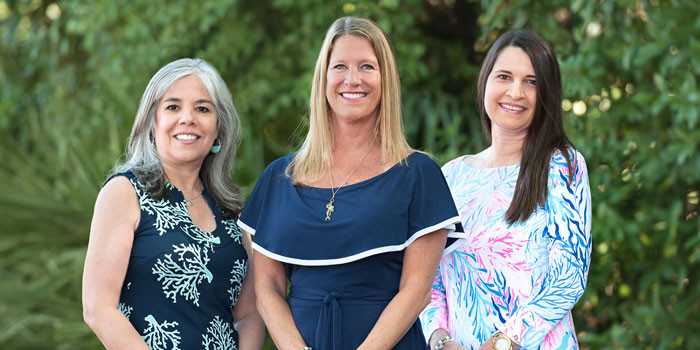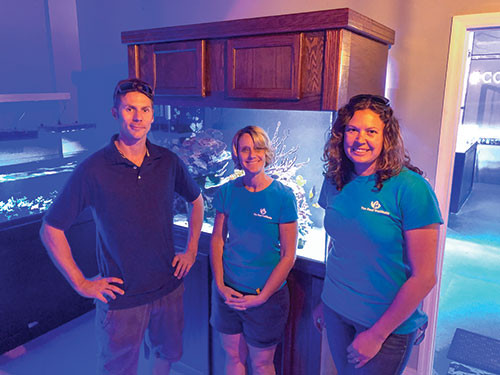Melissa Odabash
- 44 207 499 9129
- email us
- London, West Sussex, United Kingdom


SPRING 2019 (Florida Coast Magazine) – Marine life and conservation have held the spotlight in recent years; whether it’s images of oceans swamped in garbage or a beached whale with a stomach full of plastic bags, the public is left with feelings of helplessness. Buying a bracelet made from recycled plastic may make them feel like they are “doing their part,” but is there an actual plan to stop or even reverse this impending catastrophe, rather than just bandaging an already festering wound?
The short answer to this is yes, and there may even be hope for the oceans of future generations. In order to save our oceans, young people must study, enjoy, and understand them. Concealed among the pine and palm trees of Jupiter, Florida, there is a public school called Limestone Creek Elementary and here is where this amazing idea has been spearheaded by three very determined women: Principal Maria Lloyd, teachers Diana Wilson and Cheryl Kenney. Florida Coast Magazine sat down with these inspiring women to see how they have planned and implemented a marine initiative which will potentially build the next generation of marine biologists, ocean engineers, aquatic veterinarians, and environmental eco-warriors.
Though entering the principal’s office may still be a nerve wracking experience, it was soon evident all that matters to this particular principal is providing the best education possible for the students. Principal Lloyd enthusiastically explains how the Marine Initiative was implemented. “My former supervisor was looking for a principal who was willing to take on an initiative like this at a school. There are 108 elementary schools with 180 schools in total in our district (from Boca to Tequesta) and STEM, which is Science, Technology, Engineering and Math, has now been realized in a majority of elementary schools. However, no one has been marine science focused at the elementary level. I was the only principal who took the bait.”
Lloyd also points out that many principals are worried about testing and accountability highlighting. “We are of course focused on this too, but it’s about finding a balance between maintaining the school grade and keeping these initiatives. We give our kids a hands-on learning experience and the life skills they need. It’s not just regurgitating facts on a test.”
Jupiter is generally an affluent area in Palm Beach County, with many children in the area either spending time at the beach or on boats. It is therefore imperative that these children not only have a great understanding of their environment, but that they also know how to conserve it. Diana Wilson states, “We are a green school of excellence and we want our kids to learn about conservation and how to be accountable for the actions they take. Because the ocean is right here in their backyard and it is a high interest topic, the engagement levels are being raised. The kids are coming to school excited about learning and we are able to keep their attention longer. They are happy to do the more taxing work because they know they have the marine initiative to look forward to.”
Cheryl Kenney additionally emphasizes, “The kids are now recognizing the issues we have in our environment and are becoming part of the solution, through coming up with ideas to solve marine life problems.”
The school has teamed up with The Reef Institute, a non-profit organization based in West Palm Beach, to get expert help. The Director of Education at The Reef Institute, Leneita Fix, clarifies, “Principal Lloyd approached us and asked if we would be willing to help with the marine education at the school. Since that first meeting, we have been on an amazing adventure with this school. We dreamed about how to make the Marine Villa or Think Tank, a center piece of marine education. The tanks all take a different approach to helping teach on the oceans, ecosystems, and habitats in Florida and beyond. There are tanks that feature tidal pool animals, Pacific and Atlantic coral reef systems, and even sharks and rays. By placing tanks, featuring aquaponics and coral in the STEM labs, marine science can become a catalyst for multiple types of learning.”
Each child in Limestone Creek is able to visit with the marine educators in the Think Tank at least once a month, which currently puts them on campus three days a week (increasing to once a week after the summer break). Students even get to interact and learn from a marine veterinarian. They have also been able to hold urchins to learn about their anatomy, build a coral polyp out of clay, and observe the unique world in a small coral reef.
Leneita goes on to say, “It is exciting when we can see a child’s face light up at the realization of something new. We often ask students about what they are passionate about? At The Reef Institute, we care deeply about the ocean, and the plight of coral. It is estimated globally, that by the year 2050, 90% or more of the world’s coral will be gone. In Florida, this will increase our coastline’s erosion rate, resulting in homes flooding, reduced tourism, and the daily beauty we get to experience will be diminished. Whether they live here forever, or move away, our hope is to grow students who will become advocates for our Florida waters.”

According to the NOAA (National Oceanic and Administration), a mere 20% of the ocean has yet to be explored, making it a perfect stimulus for learning. It’s a great way to teach the importance of adventure, curiosity, exploration and so much more. The children of Limestone Creek are not only becoming superior caretakers of local oceans, but they are empowered to help the rest of the world.
It is estimated globally, that by the year 2050, 90% or more of the world’s coral will be gone.
The initiative covers everything from analyzing the ecosystem in the children’s local ocean, to learning how to protect it through life choices. The children are also trying to mimic the coral research being carried out at The Reef Institute, in the hope that one day their coral farming research may help our reefs.
The Florida Reef Tract is the third largest in the world running from Dry Tortugas all the way to Port Saint Lucie. To help a generation take ownership of its protection, they need to be educated entirely about how it works. Currently, there is coral at Limestone Creek housed as a seed bank and in the STEM labs, allowing students to monitor marine health.
By having The Reef Institute’s marine experts Stephanie Buttimer, Madison Brouiliette, and Leneita Fix and marine veterinarian Dr. Gregory show the students the process of farming a reef, it truly begins to solve a larger problem. Secondly, students will be fragging coral, and they will put those back into the tanks to see their growth rate. At this time, only fifth grade students will frag coral, and the goal for the current school year has been to keep the coral alive.
Currently, it is not possible to put farmed reefs back in the ocean because U.S. Biosecurity is very different compared to other parts of the world. Coral that is farmed in the ocean, or near the shore from organizations like Coral Restoration Foundation and Mote Marine Labs are able to be replanted. Leneita states, “Anything housed inland at this time cannot be put back in the ocean. There are some studies being done on that, but it is brand new, and we are actually at the forefront of that research.”
After only a year of this initiative being implemented, children, teachers, and parents are starting to see a big difference in the students’ learning habits. Diana Wilson explains, “Looking at the children’s faces and how active and passionate they become on a subject is inspiring. They are stewards developing good habits and making conscious decisions on choices they know can affect the environment.”
Scientist and executive director Elizabeth Harrigan emphasizes the multi-faceted process of coral reproduction, which can only be accomplished if we continue to educate our youth about the importance of coral reefs and stewardship at large. She states, “The students of Limestone Creek Elementary are working with biologists, zoologists, and veterinarians specifically engaging them in a hands-on curriculum to further their understanding and awe of our world. When a student has a spark that is fostered, then we have the opportunity to see real shifts in Florida’s future. Coral reefs are an integral part of the Florida ecosystem’s economy, and a first line of defense against hurricanes and storms. The Florida Reef Tract is a priceless resource to not only our marine life, but ourselves.”

It is important to highlight that this particular initiative was not funded by the school district. In order to include all of her pupils to take part in this amazing opportunity, Principal Lloyd approached the schools PTO (Parent Teacher Organization) with a business plan to potentially fund this project.
Principal Lloyd adds, “If we had gone through the school district, we would have had a limited amount of children who would have been able to take part in the plan. I didn’t want to cherry-pick; I wanted all of the children to have the opportunity to learn about the marine ecosystem and conservation. This initiative is only sustained by the money we get through the PTO. We have some parents who are supporting the cause too. For example, there is a mom who makes and sells wonderful marine inspired bracelets, with all the proceeds going to the project. Without people’s help, this life changing initiative would not be possible and we are truly thankful to them for supporting this vision.”
Principal Lloyd and her team had to cut through a lot of red tape, including having a meeting with risk management. Lloyd made it clear to them, “Tell me how, don’t tell me no.”
A force of nature in her own right and ready to fight for what she knows is right, she is one unique and determined Principal.
The way that Limestone Creek is conducting education is groundbreaking. Many schools bring in a non-profit to offer a one-time lecture for students. This school is seeking to help students truly take ownership of the ocean. To carry this learning through to middle school would be an amazing accomplishment for our youth. However, with so few principals and teachers willing to adopt this kind of hands-on for all, funding has not been easy to come by.
Educating a generation who have been become accustomed to modern conveniences may take a lifetime. With the help and guidance of the younger generation, a couple of pioneering teachers, supportive parents and a very determined principal, maybe these habits will change and our marine ecosystem will have a fighting chance at survival.
For more information on The Reef Institute and their mission to help save our ocean’s corals, visit www.reefinstitute.org.